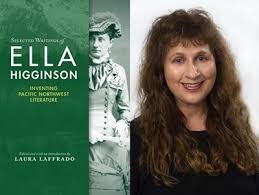Recovering Higginson: An Interview with Laura Laffrado
Forgotten Greats: Ella Rhoads Higginson is a special feature in Issue 77 of the Bellingham Review.
Laura Laffrado is most recently the author of Selected Writings of Ella Higginson: Inventing Pacific Northwest Literature, which was awarded the 2018 Edition Award by the Society for the Study of American Women Writers.
Hana Shishkarev: How did you first happen upon the work of Ella Higginson and at what point did you realize that your discovery of her work was a big deal?
Laura Laffrado: I wish that I had a dramatic aha! moment of finding Ella Higginson’s work, but in reality I stumbled upon her papers while I was conducting research on post-Civil War women in the Washington State Archives. I was very surprised to see that the archives had a holding of twelve linear feet of material by a late nineteenth-early twentieth-century American woman writer who was entirely unknown to me. The process of ultimately recognizing how celebrated Higginson had been took time, but I believe it was when I realized that she had been the very first Poet Laureate of Washington State that I knew what a literary goldmine I had stumbled upon.
HS: What parallels do you see between Ella Higginson’s work being utterly forgotten and gender politics of the late 1800s? Could she still have been forgotten if she had been a famous author today?
LL: Men returning from war displaced women from all kinds of public locations ranging from factories to the literary world. I think all authors, no matter their fame, remain at high risk of being forgotten today. Many powerful cultural agents wish to suppress the vital messages that literature conveys about the world.
HS: Was this your first experience with an author recovery project? Did you expect to take this project as far as you have?
LL: I have always been drawn to writing about and teaching neglected works, sometimes by neglected authors, sometimes by famous authors. My first book remains the only full-length study of Nathaniel Hawthorne’s neglected six books for children, while my second book focuses on forgotten women writers and their forgotten works. These books helped prepare me for what became the extensive project of recovering Ella Higginson and her work.
HS: How has the Ella Higginson project changed your career? Do you feel connected to this project in different ways than past projects you have worked on or books you have written?
LL: The Ella Higginson project has significantly changed my career in ways that I did not at all anticipate. It has led me to become informed about local and regional history, it has connected me closely to the Pacific Northwest region, and it has made my work much more public than it has ever been. As a result of this project, I have spoken to many regional groups, published quite a bit of non-academic writing, and have raised funds for the creation of a bronze bust of Higginson as well as memorial plaques on Western’s campus. Not least of all, it has been so rewarding to see my students respond positively to Higginson’s writing.
HANA SHISHKAREV is a second year graduate student studying Literature at Western Washington University. In addition to teaching English 101 to freshman students, Hana is President of the English Graduate Association, as well as the Graduate Representative for WWU’s MFA and MA programs. Hana currently lives in a quaint little rental house with three glorious cats and one really decent person.
Featured Image: “ella higginson reception (34 of 49)” by Western Washington University
